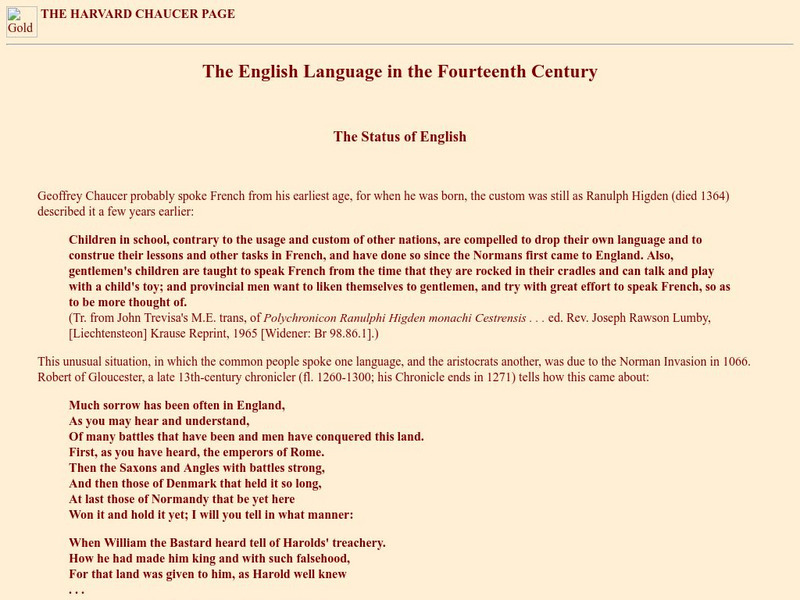Countries and Their Cultures
Countries and Their Cultures: Aimaq
In western Afghanistan and far eastern Iran, "Aimaq" means "tribal people," which distinguishes the Aimaq from the nontribal population in the area, the Persians (Fariswan) and Tajiks. Most of the population of live in Afghanistan; those...
Harvard University
The Harvard Chaucer Page: 14th Century English
This site from The Geoffrey Chaucer Page of Harvard University provides biographical information on Chaucer, specifically on his social class and his learning/speaking/writing French. Explanation for why the commoners and aristocrats...
The Wharton Group
Discover France: History of French Language
Scroll down a bit to find the brief explanations of the history of French and some dialects: Provencal, Creole, and Basque, with links to more information.
Smithsonian Institution
Smithsonian National Zoo: Zoogoer Magazine: Killer Cultures
This article covers a variety of topics related to Killer Whales including Killers on the Move, A Tale of Two Tribes, Deciphered Dialects, Eyes on the Genes, and more.
Grammarly
Grammarly Blog: Double Negatives: 3 Rules You Must Know
This page explains the 3 rules for double negatives: each subject-predicate construction should only have one negative form, a double negative is a non-standard sentence construction that uses two negative forms, and standard English is...
Other
The Romans:latin Literature
Latin was originally one of several dialects spoken in Italy - it came to dominate as a result of Roman expansion. Roman poetry was very much influenced by Greek models, and by Greek metres.
Quizlet
Quizlet: Literary Elements/humorous Fiction Terms Test
Literary terms are included in this assessment. This test assesses the following words: allusion, antagonist, dialogue, flashback, imagery, protagonist, symbol, dialect, hyperbole, idiom, irony, parody, pun, sarcasm, understatment, and...
Quizlet
Quizlet: Literary Elements/humorous Fiction Terms Flashcards
Literary elements are included in this review exercise. Flashcards are provided for the following words: allusion, antagonist, dialogue, flashback, imagery, protagonist, symbol, dialect, hyperbole, idiom, irony, parody, pun, sarcasm,...
Khan Academy
Khan Academy: Introduction to China
Much of China, a country slightly larger than the continental United States, is hilly or mountainous. To its east lies the Pacific Ocean; to its south thick jungles. Mountains in the southwest connect in the west with the Himalayas,...
Countries and Their Cultures
Countries and Their Cultures: Tiv
The Tiv are a group of about a million people who live on both sides of the Benue River, 220 kilometers from its confluence with the Niger, in Nigeria. "Tiv" is the name of the common ancestor from whom all are descended. There is a...
Countries and Their Cultures
Countries and Their Cultures: Swahili
The people known as Swahili live along the narrow East African coastline and the adjacent islands between southern Somalia and northern Mozambique; they also live in the Aomoro Islands and northwestern Madagascar, and there are Swahili...
Countries and Their Cultures
Countries and Their Cultures: Suku
"Suku" is the term now accepted by the Suku themselves and in Zaire and in the ethnographic literature. Just before and after 1900, they were often referred to as "Yaka" or, more specifically, "Yaka of MiniKongo" -- in contrast with...
Countries and Their Cultures
Countries and Their Cultures: Temne
The Temne occupy some 29,000 square kilometers of Sierra Leone's Northern Province. The Temne language is included in Greenberg's West Atlantic category and in Dalby's MEL category, which is a subdivision of West Atlantic. Dalby found at...
Countries and Their Cultures
Countries and Their Cultures: Sara
"Sara" is the term employed by outsiders to refer to a group of non-Muslim tribes in southern Chad, all of whom speak mutually intelligible dialects. Each tribe is a distinct geographic, political, and endogamous entity. Major tribes are...
Countries and Their Cultures
Countries and Their Cultures: Pedi
"Pedi," in its broadest sense, has been a cultural/linguistic term. It was previously used to describe the entire set of people speaking various dialects of the Sotho language who live in the northern Transvaal of South Africa. More...
Countries and Their Cultures
Countries and Their Cultures: Konso
The Konso are comprised of three groups living in southern Ethiopia; the Garati, the Takadi, and the Turo; that speak three very similar dialects. The Konso are intensive agriculturists, using animal and human manure and terracing to...
Countries and Their Cultures
Countries and Their Cultures: Karamojong
The Karamojong are a pastoral group who inhabit the plateau region of Uganda. Linguistically, the Karamojong belong to the Central Group of the Nilote Language Family, which also includes several neighboring groups that speak a mutually...
Countries and Their Cultures
Countries and Their Cultures: Dyula
"Dyula" is a Manding word typically referring to "traders" as a socio-professional category, particularly to Muslim long-distance traders who speak one or another dialect of Manding. The name is used as an ethnic label by...
Countries and Their Cultures
Countries and Their Cultures: Akan
The Akan comprise a cluster of peoples living in southern and central Ghana and in southeastern Ivory Coast. They form a series of distinct kingdoms and share a common language, known as Twi, which has many dialects. Twi is a tonal...
PBS
Pbs Learning Media: Math + Arts: Jack & the Zero Clan
For this lesson, students will create and solve a word problem related to adding and subtracting within 1,000, develop a script for a short scene using dialect, and perform it using the elements of performance, specifically acting,...
Countries and Their Cultures
Countries and Their Cultures: Mande
"Mande" is a term that has been used to identify the culture that embraces the western third of Africa's great northern savanna and coastal forests. The Mali Empire was the source of the Mande diaspora; therefore, in a broad sense,...
Countries and Their Cultures
Countries and Their Cultures: Mongo
The Mongo inhabit the Congo Basin of central Zaire. They speak a dialect or language within a larger group of Mongo languages. Ideological and moral principles and social reality are mirrored in the culture of the Mongo, particularly in...
Marxists Internet Archive
Encyclopedia of Marxism: Homepage
This site from the Marxists Internet Archive provides a detailed explanation including quotations from Engels and Marx, as well as explication. Links defining terms are helpful, as is the suggested further reading link.
Other
Esl Teachers' Board: Survival Arabic for Teachers
While the pronunciations are a bit off, this is an ultimately useful list of basic classroom vocabulary (e.g., Stand) and phrases (e.g., What's the difference?) of use to the ESL teacher with Arabic speaking students. It provides a basis...
Other popular searches
- Regional Dialects
- Southern Dialects
- Language Dialects
- Dialects and Accents
- British Dialects
- American Dialects
- Dialects Zora Neale Huston
- Dialects Zora Neale Hurston
- Spanish Dialects
- Major Regional Dialects
- British Dialects Drama









